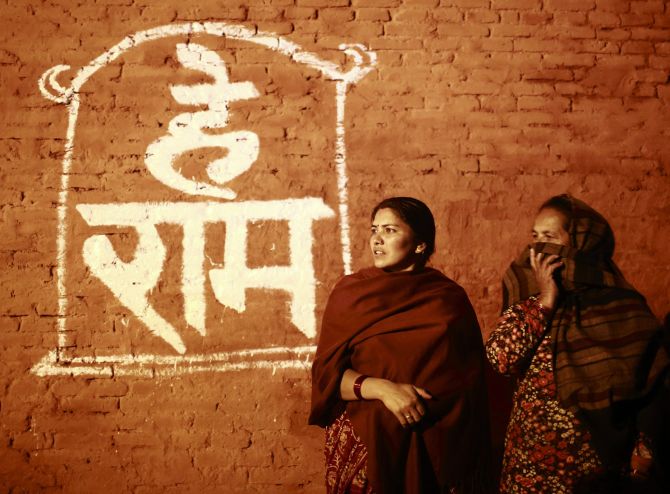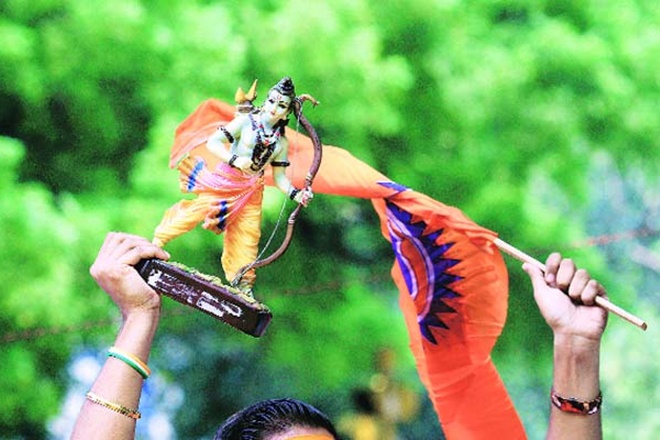
70 years, 2 minutes, indefinite date of January 2019
Why if one sees Congress Connection in SC
Sibal is obeyed today
When parties indicate urgency and an early hearing, CJI-led Bench clarifies that it cannot really say when hearing will begin.
A three-judge Bench of the Supreme Court, led by Chief Justice of India (CJI) Ranjan Gogoi, on Monday posted the Ayodhya title suit appeals in January before an appropriate Bench to fix a date for hearing the case.
When parties indicated urgency and an early hearing, the CJI-led Bench clarified that it cannot really say when hearing would begin. It left it to the discretion of the “appropriate Bench” before which the matter would come up on January.
“We have our own priorities… whether hearing would take place in January, March or April would be decided by an appropriate Bench,” the CJI said.
The CJI repeated that all the court was ordering was that the appeals would come up in January first week before a Bench “not for hearing but for fixing the date of hearing”.
On September 27, a three-judge Bench of the court led by then Chief Justice Dipak Misra, in a majority opinion, decided against referring the question ‘whether offering prayers in a mosque is an essential part of Islam’ to a seven-judge Constitution Bench.
With this, the court had signalled that it would decide the appeals like any other civil suit, based on evidence, and pay little heed to arguments about the “religious significance” of the Ayodhya issue and the communal strife it has led to over the past many years.
The Misra Bench’s judgment, authored by Justice Ashok Bhushan on the Bench, directed the hearing in the appeals to start from October 29. This last paragraph in the September 27 judgment led to questions whether the court would deliver a judgment in the appeals before the May 2019 general election.
These appeals are against the September 30, 2010 verdict of the Allahabad High Court to divide the disputed 2.77 acre area among the Sunni Waqf Board, the Nirmohi Akhara and Ram Lalla. The Bench had relied on Hindu faith, belief and folklore.
Lord Ram’s birthplace
The High Court concluded that Lord Ram, son of King Dashrath, was born within the 1,482.5 square yards of the disputed Ramjanmabhoomi-Babri Masjid premises over 900,000 years ago during the Treta Yuga. One of the judges said the “world knows” where Ram’s birthplace was while another said his finding was an “informed guess” based on “oral evidences of several Hindus and some Muslims” that the precise birthplace of Ram was under the central dome.
The final hearings in the Ayodhya appeals began before the Misra Bench, also comprising Justice S. Abdul Nazeer, on December 5 last.
The day happened to be the eve of the 25th anniversary of the demolition of the 15th century Babri Masjid by kar sevaks on December 6, 1992. The appeals were taken up after a delay of almost eight years. They remained shelved through the tenures of eight Chief Justices of India from 2010.
However, the Muslim appellants, a cross-section of Islamic bodies like the Sunni Wakf Board and individuals, had drawn the Bench’s attention to certain paragraphs in a 1994 five-judge Constitution Bench judgment in the Dr Ismail Faruqui case. One of these paragraphs stated that “a mosque is not an essential part of the practice of the religion of Islam and namaz [prayer] by Muslims can be offered anywhere, even in open”.

Mosque and Islam
“So is the mosque not an essential part of Islam? Muslims cannot go to the garden and pray,” their lawyer and senior advocate Rajeev Dhavan had asked the court. He asked the Bench to freeze the Ayodhya appeals’ hearing till this question is referred and decided by a seven-judge Bench.
In their majority view, Chief Justice (retired) Misra and Justice Bhushan refused to send the question to a seven-judge Bench. Their opinion said the observations were made in the context of the Faruqui case which was about public acquisition of places of religious worship. It should not be dragged into the Ayodhya appeals. The minority decision authored by Justice Nazeer dissented with the majority on the Bench, and said this observation about offering prayer in a mosque influenced the Allahabad High Court in 2010. He questioned the haste of the court.
During the maiden Supreme Court hearing of the Ayodhya appeals last year, senior advocate Kapil Sibal suggested to the court to post the Ayodhya hearings after July 15, 2019.
Along with Mr. Sibal, senior advocate Dushyant Dave and Mr. Dhavan argued that the Ayodhya dispute was not just another civil suit. The case covered religion and faith and dates back to the era of King Vikramaditya. It is probably the most important case in the history of India which would “decide the future of the polity”. The appeals would have the court decide “whether this is a country where a mosque can be destroyed”.
“These appeals go to the very heart of our secular and democratic fabric,” Mr. Dhavan had submitted.
Mr. Sibal had alleged the government was using the judiciary to realise its agenda for a Ram mandir assured in the ruling BJP’s 2014 election manifesto.



